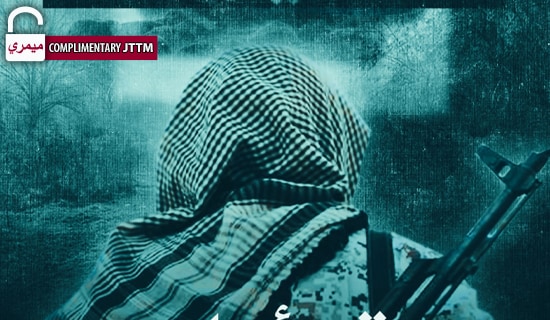The following report is now a complimentary offering from MEMRI's Jihad and Terrorism Threat Monitor (JTTM). For JTTM subscription information, click here.
On September 7, a Telegram channel publishing ISKP-related material posted a Pashtu-language video criticizing Afghan Taliban member and follower of Sufism Khalifa Deen Muhammad, who is also the head of Ulema Council of the Taliban in Kabul province and whom ISKP accuses of supporting Sufism. The ISKP video is critical of the Taliban for supporting Khalifa Deen Muhammad's views on shari'a, saying some of his fatwas emerged on social media and most of the people reject them.

The video was released on a Telegram channel
The Pashtu-language video, titled "Wisdom And Knowledge Of Apostate Sufi Din Muhammad," discusses the beliefs of Pashtu-speaking Islamic religious scholar Khalifa Deen Muhammad, who is a Sufi famous among the Taliban and the Pashtun community in Afghanistan. Taliban leader Mawlawi Hibbatullah Akhundzada has appointed him head of the provincial council of Kabul.
Khalifa Deen Muhammad also runs a madrassa in Kabul and teaches hundreds of students. Recently, some of his statements about aqeeda ("creed") and Sufism, with which many scholars have disagreed, have been widely published on social media, and some are mocking them. ISKP released a video criticizing him.

Khalifa Deen Muhammad is shown with Afghan Taliban Interior Minister Sirajuddin Haqqani
The ISKP video, which is published by The Al-Azaim Media Foundation, a media outlet linked to the Islamic State Khorasan Province (ISKP), which defines itself as a supporting entity for the Islamic State (ISIS), uses Khalifa Deen Muhammad as an example of the Taliban's beliefs.
The video declares Khalifa Deen Muhammad to be an apostate and an idolater and adds that all Taliban leaders, including Taliban emir Mawlawi Hibbatullah Akhundzada, share the same belief, meaning that they are outside the fold of Islam.
The narrator in the video is ISKP media operative Sultan Aziz Azzam. According to the video, Khalifa Deen Muhammad's ideas contradict shari'a, Islamic teachings, and the teachings of Prophet Muhammad.
After rejecting the beliefs and theories of Khalifa Deen Muhammad and also noting the existence of such persons among the ruling Taliban and citing their statements as evidence, the narrator rejects all of their arguments. In order to reject Khalifa Deen Muhammad's views, ISKP religious scholar Sheikh Abu Fateh cites arguments from the Quran, hadiths, and the views of Islamic religious scholars.

A photo of ISKP religious scholar Sheikh Abu Fateh in the video
Among those scholars mentioned is 14th-century Islamic scholar and Sheikh Al-Islam Taqi Al-Din Ibn Taymiyya, whom Jihadis quote and reference frequently for, among other things, his anti-Shi'ite stance and his writings permitting the killing of those who insult Muhammad.
The ISKP video warns ordinary Muslims not to be deceived by Sufis and to avoid them. At the end of the video, the narrator addresses the Taliban and their scholars, warning that ISKP will disgrace the Taliban's and Sufis' superstitious beliefs.

The full text of this post is available to subscribers.
Please login or register to request subscription information from MEMRI









